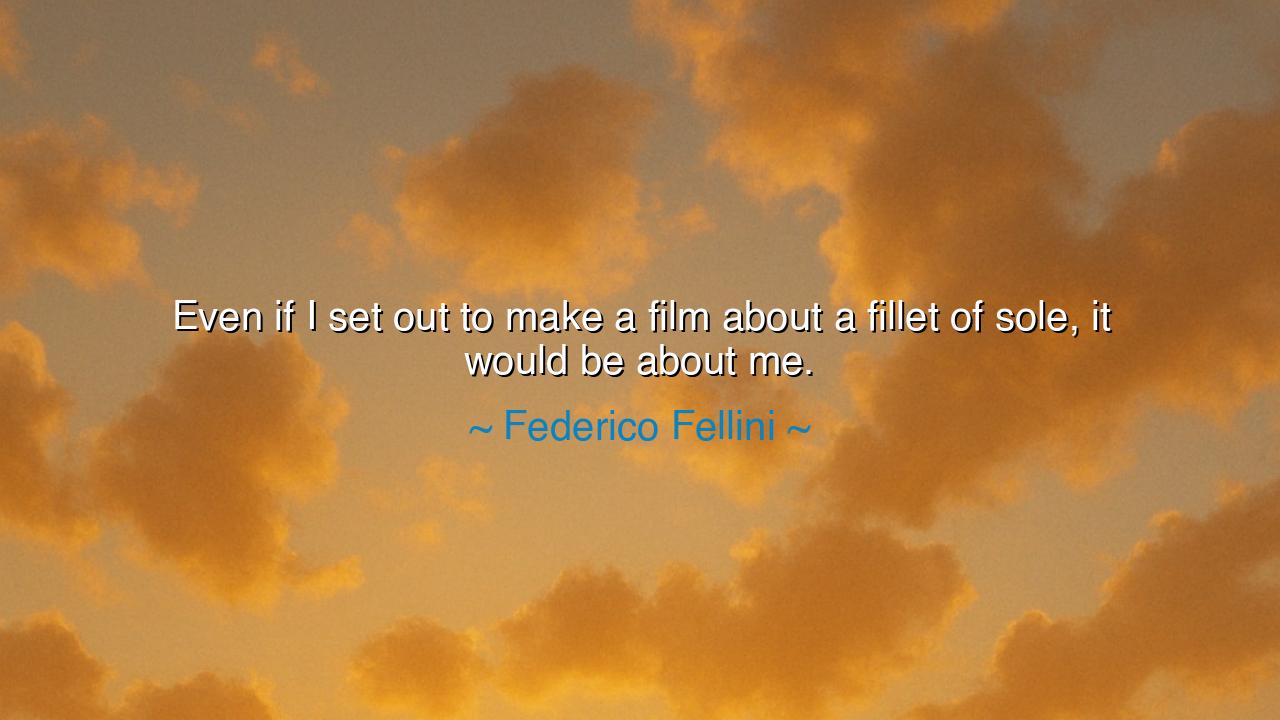
Even if I set out to make a film about a fillet of sole, it






"Even if I set out to make a film about a fillet of sole, it would be about me." These words from Federico Fellini, one of cinema’s greatest masters, reveal a profound truth about the relationship between the artist and their creation. Fellini’s admission speaks to the inherent subjectivity of the creative process, where the artist cannot help but imprint their own experiences, thoughts, and emotions upon their work. No matter the external subject—be it a fish, a landscape, or even a simple object—the work will always reflect the inner world of the creator. In this sense, the act of creation is a deeply personal journey, an expression of the self that cannot be wholly divorced from the artist’s own soul.
This statement holds particular power when understood in the context of Fellini’s body of work, which is famously surreal, often blending the fantastical with the deeply personal. His films are not just about the surface story—they are windows into his psyche, showcasing his inner conflicts, dreams, and desires. Whether it’s the intricate emotional landscapes of La Dolce Vita or the dreamlike sequences in 8½, Fellini’s films are reflections of the human experience, portrayed through the lens of his own experiences and imagination. Thus, when he says that even a film about a fillet of sole would be about him, he is acknowledging the inescapable truth that every creator is bound to leave an imprint of themselves on their work. It is not the subject that defines the art, but the vision of the artist.
The notion that art is a reflection of the self is not unique to Fellini. In the ancient world, the Greeks understood the artistic process as an act of deep self-exploration. Socrates, in his reflections on life and knowledge, taught that the unexamined life is not worth living. He suggested that through the pursuit of wisdom, individuals could better understand their true nature, an idea that deeply influenced Plato and other thinkers. In many ways, art, for the ancient philosophers, was seen as a means of revealing the truth about the artist’s soul. Whether through poetry, sculpture, or philosophy, the works of these ancient thinkers were windows into their understanding of the world, their struggles, and their desires—just as Fellini’s films are reflections of his own unique vision.
In modern history, figures like Vincent van Gogh provide another poignant example of how an artist’s inner world manifests in their work. Van Gogh’s paintings, particularly his self-portraits and landscapes, reflect not just the physical world around him but also his emotional turmoil and longing. His most famous works, such as Starry Night, are imbued with the raw energy of his inner struggles and his search for meaning in a world that often felt isolating and cruel. Despite the apparent simplicity of the subject matter—stars, trees, and fields—what resonates with us is the intensity of the emotions and personal experiences that these images convey. In much the same way, Fellini’s films, even if set in entirely different worlds or dealing with fantastical subjects, are grounded in the personal experiences of their creator.
The lesson that emerges from Fellini’s words is one of self-awareness and honesty in the act of creation. To create is to offer a piece of oneself to the world. The more authentic and vulnerable the artist is, the more profound the connection their work will have with others. This idea is deeply liberating—it frees the artist from the need to imitate or please others. When an artist embraces their own vision, when they allow themselves to be honest and true in their work, the art becomes not just an external object but a living expression of their inner world. This authenticity allows the work to transcend mere technique or subject matter and instead resonate with universal truths that speak to the hearts of others.
In practical terms, the wisdom of Fellini encourages us to embrace our own individuality and to create from a place of deep self-knowledge. Whether we are artists, writers, or simply individuals trying to navigate our own lives, the key lies in understanding who we are and allowing that understanding to shape what we produce. Just as Fellini cannot escape himself in his films, we too cannot escape the truth of who we are, even if we try. When we learn to create from our own truth, when we embrace our unique perspectives and voices, we will produce work that is both authentic and powerful.
Thus, let us heed Fellini’s wisdom and recognize that every creation, no matter how simple or grand, carries the fingerprints of its maker. To create is to reveal oneself, and in revealing ourselves through our work, we invite others into the depths of our soul. It is only through such vulnerability and self-expression that we can create something truly meaningful, something that transcends time and space, speaking to the universal human experience. So, whether we are making films, painting pictures, or building something with our hands, let us be true to our own vision, for it is through our authenticity that the world will truly see the richness of our inner lives.






AAdministratorAdministrator
Welcome, honored guests. Please leave a comment, we will respond soon